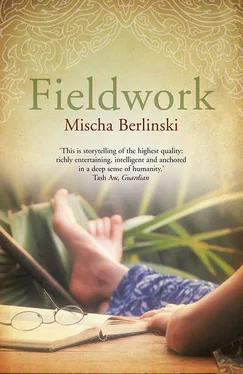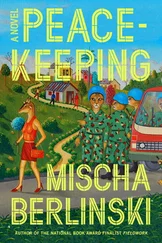Pastor James knelt down every Sunday alongside the members of the accursed Vampire clan, and Old Limping Lady, and others. And Hupasha remained a Christian. Every night Martiya expected to hear the news that he had renounced his faith, to hear his footsteps on the porch of her hut. She asked for news from every traveler who passed his way, and the same news always returned: they had found him distracted with the Big Book.
It was at the end of that terrible cold that Farts-a-Lot, waking up early, noticed the flames coming from Martiya's hut. When he burst inside, he found her sprawled asleep and pulled her from the cottage just as the ceiling collapsed. Martiya tried to break free of Farts-a-Lot's arms and go back inside, but he held her back. Over his shoulder she watched the hut burn, and with it her row of spiral-bound, hard-sided notebooks, perhaps forty in all: almost fifteen years of field notes, essays, and a manuscript draft, now nearly completed, of The Dyalo Way of Life .
Martiya had no place to go. Lai-Ma and Farts-a-Lot took her back in, as if she were starting over, as if her life still lay before her, and the old songs of Sings Soft were still on every tongue, and Pell was waiting for her back home.
Days later, the shaman summoned the elders of Dan Loi to his hut, and there informed them of his professional opinion: that the string of misadventures in the village was not random, but rather the work of a disgruntled spirit — the spirit of David Walker.
The villagers of Dan Loi became convinced that George Washington's hypothesis squared with the facts: that one (or several) of David Walker's souls had not been carted off with his corpse, and that, far from its loved ones, it was wandering through village, making mischief.
Over a series of tense nights, the shaman entered into his trance and tried to reason with the spirits. I have no idea what happened to the shaman when the spirits seized him. All I can say is this: both Lai-Ma and Farts-a-Lot, like the others in the village, were convinced that the shaman was visiting with the dead David Walker. And David Walker had a tale to tell.
How did the shaman come to know the facts? He knew that Martiya kept a hunting rifle. He knew about Martiya and Hupasha. Maybe he looked into her face and saw the story written there.
Or maybe he went into his trance and communed with the dead.
Everyone agreed that action must be taken. Debate raged in the village. The headman, who had never even after all these years wholly trusted Martiya, proposed settling the situation in the simplest of all possible ways, with a bullet in the back of the head. Had a Dyalo man or woman shot David Walker, this is surely how the situation would have been resolved. Dyalo justice was very much of an eye-for-an-eye sort; there are no jails in a Dyalo village.
The villagers approved the headman's proposal, and only the lack of a willing executioner got in the way. No man in the village wanted to shoot Martiya himself, and although there was a Lahu man willing to do the job, it wasn't clear who would pay him.
Besides, if one dead farang was bad, wouldn't two be worse?
Lai-Ma and Farts-a-Lot did not recall who in the end proposed denouncing Martiya to the police. Lai-Ma thought it might have been Stupid Squirrel, and Farts-a-Lot thought it was Pastor James. But the villagers were agreed on the plan: it was not the Dyalo way of handling things, but Martiya was not, after all, Dyalo.
The day had gone from cool to hot to cool again. I excused myself from the hut. The last light breaking over the dark green mountains was gold and orange. The huts were cloaked in brilliant ringlets of fiery bougainvillea, and in the valley below I could see Karen maidens all in white, in sharp relief against the green fields. Everything was quiet. I made my way around the bend of the village, along the path that led through the ancient bamboo groves, until I found myself on a large rock overlooking the whole of Dan Loi. This was the rock, I realized, on which Martiya herself had whiled away so many hours at just this time of day. From this high rock, there could have been no more exotic and incomprehensible place than a Dyalo village: the sloping thatched huts, the rootings pigs, the shrine of the Old Grandfather, just barely visible in a clearing in the woods. Then, in a language not one word of which I understood, someone began to sing, breaking the stillness of the evening.
I wondered what the song meant.
My story — the story of my involvement in Martiya van der Leun's murder of David Walker — for all practical purposes ended there. I ceased to pursue witnesses, I never went back to the big pink house to sit again with Norma Walker and her husband on the matching fake-leather couches. But I expect that they are still there, that their grandchildren are off spreading the Word, that Thomas Walker is looking out on the horizon and seeing the storm clouds of the Apocalypse approaching.
One last detail will complete my story.
Not long ago, I received an e-mail from Josh O'Connor. He wrote that he had received word from the editors of both Ethnology and the Southeast Asian Journal of Social Science . Almost two years earlier, he had done as Martiya had asked: he had typed up her two remaining manuscript papers, both ethnographies of life at Chiang Mai Central Prison, and sent them off. Now, after a pause so long that Josh had completely forgotten the contents of the papers themselves, he had received responses from the editors. Both papers had been accepted. The anonymous reviewers were congratulatory. The critics had no idea of the circumstances under which Martiya had written, and imagined her an academic anthropologist conducting fieldwork in the traditional manner. "A deep and profound sympathy for the subjects," wrote one critic; and another, "A superb and detailed contribution to the ethnographic corpus detailing the conditions of incarceration for women."
When the papers are eventually published, they will represent the totality of Martiya van der Leun's contribution, after almost thirty years in Southeast Asia, to the anthropological literature.
Enclosed with the acceptance letters were two small checks. And that was why Josh O'Connor was writing to me. Did I have any idea, he asked, what he should do with a check addressed to Martiya van der Leun? Did I think he could cash it?
This novel began not as fiction but as a history of the conversion of the Lisu people of northern Thailand to Christianity. Then one afternoon, I woke up from a long nap with a plot in my head, and my history became a novel. At that moment, I abandoned any intention I had to tell a true story. The Dyalo do not exist, except in these pages. None of this stuff happened to anyone.
In the service of my original project, while living in Chiang Mai I spent hours talking with a number of missionaries. I would like to thank David Morse, Eugene Morse, Helen Morse, Joni Morse, the Reverend Andy Thomson, Gam Shae, and Jesse Yangmi for their generosity and time. My greatest debt, however, is to the late Gertrude Morse, whose wonderful, rich, and moving memoir, The Dogs May Bark: But the Caravan Rolls On (Joplin: College Press Publishing, 1998), informed so much of the writing of this book. Mrs. Morse gave me a glimpse of the profound faith, the reckless daring, and the absolute confidence required of a great missionary.
I also would like to thank Otome Klein Hutheesing. Ms. Hutheesing is an extraordinary scholar — and, as those who know her will gladly testify, an equally impressive woman. Her ethnography Emerging Sexual Inequality Among the Lisu of Northern Thailand: The Waning of Dog and Elephant Repute (Leiden: Brill, 1990) brings to life the secret world of a Lisu village. The time that I spent with Ms. Hutheesing gave me my clearest idea of how an anthropologist sees the world.
Читать дальше












